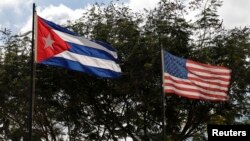A senior U.S. official says the United States and Cuba have reached agreement to reopen embassies in each other's capitals for the first time in more than 50 years.
The White House says President Barack Obama plans to make a statement on Cuba Wednesday from the Rose Garden, while Secretary of State John Kerry will speak in Vienna, where he is taking part in nuclear talks with Iran.
Cuba's foreign ministry says the chief of the U.S. interests section in Havana, Jeffrey DeLaurentis, will deliver a note Wednesday from Obama on reopening embassies.
According to Reuters, Kerry is likely to travel to Havana during the week of July for a flag-raising ceremony to reopen the American embassy. The White House will disclose the exact timing, a U.S. official said.
Obama made history in December when he said he wanted to end the long-standing U.S. trade embargo against Cuba with an eye on reestablishing diplomatic ties.
Delegations from both sides have been holding talks in Washington and Havana ever since.
In one significant sign of the diplomatic thaw, Cuba recently came off the U.S. list of state sponsors of terrorism. Obama announced on April 14 that he would delete Cuba from the list, initiating a 45-day review period that expired on May 29.
Obama said isolating Cuba through trade and travel embargoes has achieved nothing and did not bring about a democratic and prosperous country. He said it is time for a new approach.
But opponents of diplomatic relations with Cuba, including many refugees from the island, say it would be rewarding the Castro government.
Both countries can now upgrade their so-called interests sections in Havana and Washington into full-blown embassies, with ambassadors to be appointed later. The State Department must give Congress a 15-day notice before opening an embassy.
Even after embassies are opened, the U.S. and Cuban governments still face a number of sensitive issues, including U.S. demands for more human rights for Cubans.
Restoration of relations would be the latest phase in a normalization process, which is expected to move slowly because of lingering problems over issues such as Cuba's human rights record. A U.S. embargo will remain in place, and only Congress can lift it.
Cuba once thrived on U.S. tourism and investment and was for a long time a playground for the rich with numerous hotels, casinos and beachfront resorts.
Relations quickly evaporated when Fidel Castro overthrew President Fulgencio Batista on New Year's Day, 1959 and established a communist dictatorship, taking over U.S. assets. The U.S. severed diplomatic ties with Havana two years later and imposed a total economic embargo in 1962.
Cuba relied heavily on the Soviet Union for economic and military aid. Moscow used Cuba to build nuclear missile launch sites on the island in response to U.S. missiles in Turkey.
The standoff between the two superpowers in October 1962 became known as the Cuban Missile Crisis and brought the globe close to nuclear annihilation before Washington and Moscow mutually agreed to back down.
Cuba has struggled economically since the collapse of the Soviet Union in 1991.
Some information for this report provided by Reuters.









